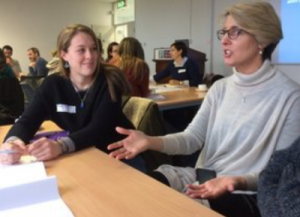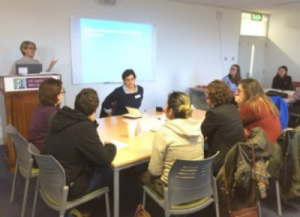The Problem of Plastics
 Plastic marine litter has recently attracted public attention due to a regular flow of media releases. However, marine litter presents one aspect of a much larger problem. During a sabbatical from Massey University (New Zealand) this year, I spent a week as a Visiting Fellow at the Moore Institute, working with colleagues in Geography, especially my host, Dr Frances Fahy (Head of Geography) and Dr Tom Doyle (Ryan Institute) to develop an understanding of the challenges associated with plastics and plastics research in Ireland and to encourage cross-pollination across the social and natural sciences.
Plastic marine litter has recently attracted public attention due to a regular flow of media releases. However, marine litter presents one aspect of a much larger problem. During a sabbatical from Massey University (New Zealand) this year, I spent a week as a Visiting Fellow at the Moore Institute, working with colleagues in Geography, especially my host, Dr Frances Fahy (Head of Geography) and Dr Tom Doyle (Ryan Institute) to develop an understanding of the challenges associated with plastics and plastics research in Ireland and to encourage cross-pollination across the social and natural sciences.
During my visit, I led a forum on plastic waste. The forum was well-attended by geographers and marine scientists from NUI Galway’s Moore Institute and Ryan Institute, as well as from GMIT. I led a morning session with a presentation on the need for more inter- and transdisciplinary research across the social and natural sciences that politicises the challenges posed by the production, consumption, and disposal of plastics.
The main message was that anthropologists and other social scientists can politicise and provide socio-cultural context to the excellent scientific work produced by natural and life science researchers and that more genuine inter- and transdisciplinary work is urgently needed in this area: work that generates the kinds of innovative ideas and practical solutions that transcend the traditional limitations of the home disciplines of each collaborating researcher.
 I believe that only by collaborating across the social and natural sciences will we make real progress in academic and public understanding of the current challenges and potential solutions to local and global plastic challenges. The key is to ensure our research is presented in a variety of formats so that we reach those with the capacity to catalyse meaningful social and cultural transformation: in particular, those who have the real power to advocate for, and implement, policy and legislation. This also means that our research needs to emphasise the social cultural and political limitations to ‘getting the job done and getting it done right.’
I believe that only by collaborating across the social and natural sciences will we make real progress in academic and public understanding of the current challenges and potential solutions to local and global plastic challenges. The key is to ensure our research is presented in a variety of formats so that we reach those with the capacity to catalyse meaningful social and cultural transformation: in particular, those who have the real power to advocate for, and implement, policy and legislation. This also means that our research needs to emphasise the social cultural and political limitations to ‘getting the job done and getting it done right.’
The Ryan Institute and GMIT presentations that followed captured the impressive quality, value, depth, and breadth of their current plastics research. Six groups generated lively discussions in World Café format. The groups were prompted to discuss research that would best respond to the most pressing challenges posed by plastics. They were then asked how interdisciplinary collaborations (across the social and natural sciences) could valuably respond to these challenges. The discussions culminated in some innovative interdisciplinary research ideas. I am currently following up on one of those ideas with Dr Doyle and two of his PhD candidates.
One of my major activities this year will be co-organising an international conference on The Lives and Afterlives of Plastic, a carbon-neutral event from June 26 to July 14, 2017. The presenters come from a wide variety of disciplines, as we had hoped, including natural scientists, politicians and political studies researchers, artists, media researchers, engineers, and social scientists. The key note speakers also span the disciplines: Richard C. Thompson, Professor of Marine Biology, Plymouth University; Gay Hawkins, Professor of Cultural Studies, Western Sydney University; and Ian C. Shaw, Professor of Toxicology, University of Canterbury.
Trisia Farrelly
Dr Trisia Farrelly is a Senior Lecturer in Environmental Anthropology at Massey University and Co-Director of the Political Ecology Research Centre. She is also co-founder of Carrying Our Future, a community campaign group dedicated to phasing out single-use plastics in New Zealand, and co-founder of the New Zealand Product Stewardship Council. Dr Farrelly was awarded a Moore Institute Visiting Research Fellowship for her research at NUI Galway in January this year.

